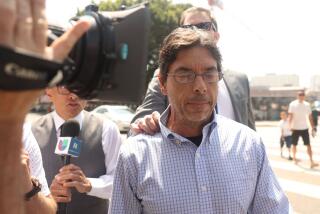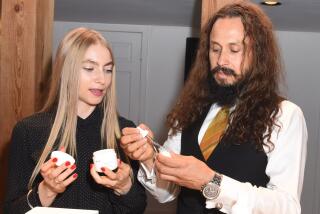3 to Plead Guilty in Lab Fraud
- Share via
The physician owner and two employees of a Whittier pharmaceutical-research laboratory have agreed to plead guilty to charges that they conspired to falsify test results used by the Food and Drug Administration to determine the safety and effectiveness of new drugs, U.S. Atty. Nora M. Manella said Friday.
The case involved nearly a dozen human clinical studies conducted by the Southern California Research Institute on a variety of drugs, including ones to treat asthma, birth control, diabetes and sinusitis. In each case, the lab was hired by major drug firms to perform the tests.
For the record:
12:00 a.m. Oct. 3, 1997 For the Record
Los Angeles Times Friday October 3, 1997 Home Edition Business Part D Page 3 Financial Desk 3 inches; 85 words Type of Material: Correction
Southern California Research Institute--A story Saturday reported that three employees of a Whittier drug-research company agreed to plead guilty to federal charges of conspiring to falsify test data used by the Food and Drug Administration. The company was identified in the story both as Southern California Research Institute, the firm’s name at the time the offenses were committed, and by its new name, American Pharmaceutical Research Inc. The firm is not associated in any way with the Los Angeles-based nonprofit scientific research organization Southern California Research Institute.
In one drug study, the private lab owned by Dr. Robert A. Fiddes created dozens of fake patients, the government said. In other studies, lab employees illegally substituted their own blood or used medical data from their family members in order to submit bogus data to drug companies and the government, prosecutors said.
Prosecutors said the apparent motive was to save money and time when legitimate test subjects were difficult to find. There was no indication that test results were rigged to benefit drug companies.
“This is very disturbing news that we would want to investigate immediately,” said Donald Hyman, a spokesman for Bayer Corp., which contracted with the Whittier lab for testing on the anti-fungal clotrimazole in 1996. In that test, lab employees are accused of fabricating test results to make it appear that more than 25 patients participated in the study when, in fact, only one did.
The FDA, one of several agencies that participated in the investigation, said it had not yet determined if the Whittier lab’s research had played a significant role in approval of any drugs now on the market. The research fraud took place on studies conducted between 1992 and 1996, prosecutors said.
“We will look at this and make sure there is nothing wrong with any of the products,” said Don McLearn, an FDA spokesman.
McLearn and drug company representatives said federal regulations make it unlikely that data from a single clinical study would, by itself, play a significant role in the drug-approval process. With some exceptions for “lifesaving” drugs to treat AIDS or other diseases for which few or no treatments exist, the FDA requires at least two scientific studies of a drug before it can get approval.
Bogus studies are rare, McLearn said, and “when you have one bad apple, there is other data to show that the drug is safe and effective.”
The Whittier lab case comes as Congress considers legislation that would loosen federal rules governing drug approval. One Senate bill, sponsored by Sen. James M. Jeffords (R-Vt.), would let the FDA use just one study in more instances.
In the federal plea agreement announced Friday, Fiddes, 52, of Palos Verdes, agreed to plead guilty to conspiring to make false statements to the FDA. Fiddes is the owner and president of the Whittier lab, which recently changed its name to American Pharmaceutical Research Inc.
Fiddes, through his attorney, Ellyn S. Garofalo, issued a statement acknowledging responsibility for his company’s test problems. He claimed none of the studies “jeopardized the safety of the drugs or of those patients using them.” Laverne Charpentier, 50, of Walnut, and Delfina Hernandez, 34, of Whittier, also agreed to plead guilty to conspiracy charges. Both worked as senior research managers at the lab, prosecutors said.
The government was alerted to the fraud by lab employees and others in August 1996, said Steven Linick and Lawrence Ng, the assistant U.S. attorneys who prosecuted the case.
The government’s plea agreement with Fiddes also names Elaine Lai, Southern California Research’s chief operating officer, as a participant in the lab-fraud conspiracy. Lai has not been charged in the case, Linick said.
Linick said the lab falsified test results when it could not find enough patients who met the study’s eligibility criteria.
“When they couldn’t find people who met the medical criteria, they just made it up,” Linick said.
For example, a study of a sinusitis drug made by Rhone-Poulenc Rorer required participants to undergo an uncomfortable nasal puncture. Because some patients didn’t want to submit to the nasal procedure, the lab enrolled people without performing it.
Another study, for drug maker SmithKline Beecham, required participants to have unusually high levels of protein in their urine.
“Because it was difficult to enroll patients” with the required protein levels, prosecutors said, Fiddes directed lab workers to substitute urine with the required protein level so that otherwise non-qualifying patients could enroll in the study.
In another instance, prosecutors charge that Charpentier ordered the destruction of X-rays that showed that patients didn’t have the type of arthritic knee conditions required for the study.
Drug companies paid the Whittier lab as much as $270,000 for a single study.
Fiddes, Charpentier and Hernandez are scheduled to be arraigned in federal court in Los Angeles on Monday. Each faces a maximum prison term of five years. Fiddes has also agreed to pay restitution of more than $800,000.
More to Read
Sign up for Essential California
The most important California stories and recommendations in your inbox every morning.
You may occasionally receive promotional content from the Los Angeles Times.













